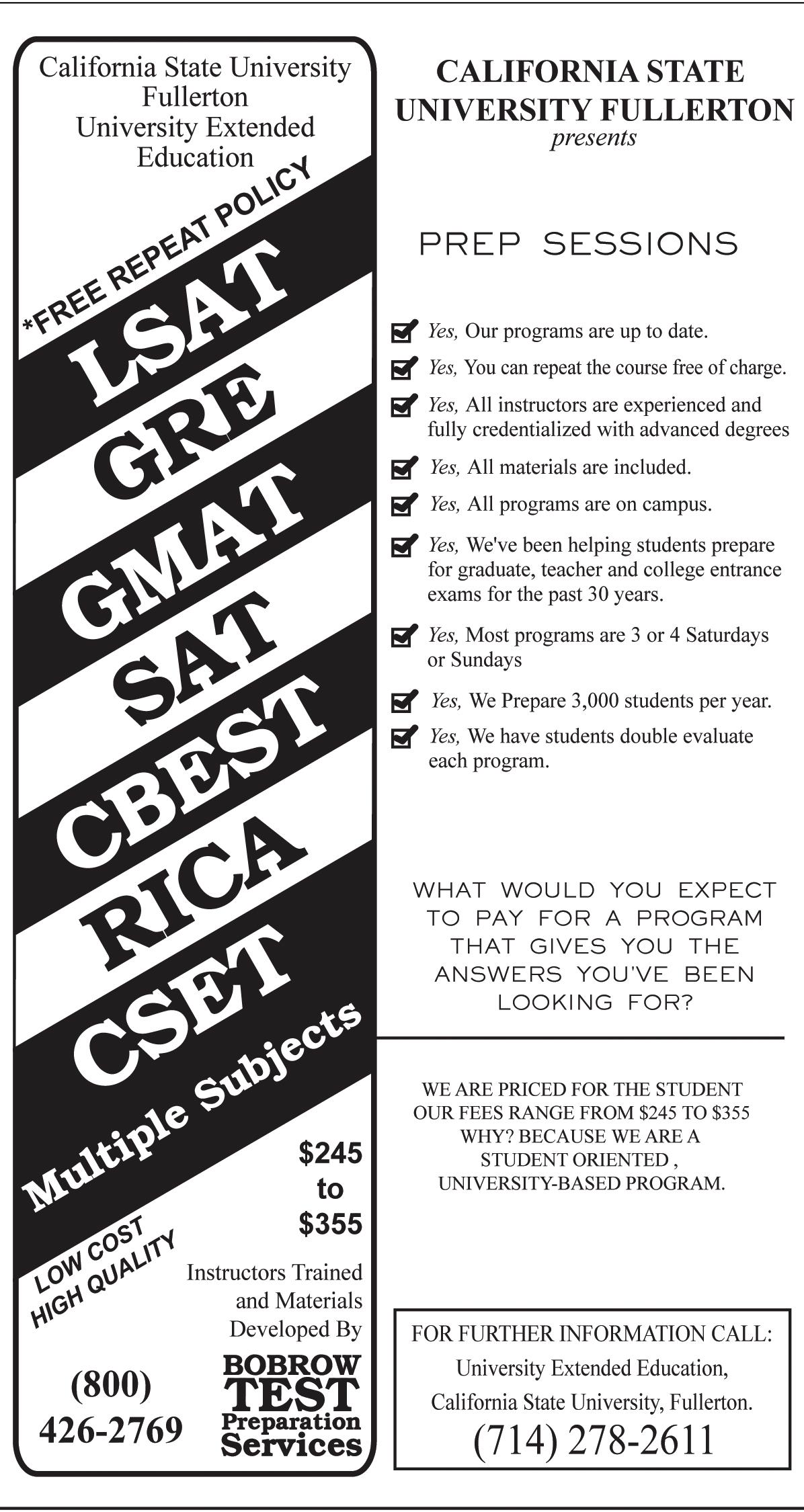
8 minute read
COLUMN: College life
College Life Welcome Reprieve From Summer’s Dog Days Commentar y
By Ben Alexander U-Wire – University Daily Kansan
Advertisement
LAWRENCE, Kan. – My grandma, who of course came to “help me move in,” said it was just like my first day of kindergarten. Well, college hasn’t made me cry yet, and chicken pox is already out of the way, but we’ll see.
Maybe she meant that I came to college in a minivan. I needed the space of the family mini for all the wonderful college-y things that I’d been conned into buying, not to mention the six people who came to Lawrence, Kan., with me to offer moral support. They were in the support car.
This is not the beginning of the story, however.
The beginning was sometime in my sophomore year of high school, when the guidance counselor came to give us a speech about college. Well, that and the ritual threats from my teachers: “You won’t be able to get away with this in college!”
Since then I have probably spent more than $100 on study books and
thousands more on transfer credits and various standardized tests, all with one purpose in mind: to soften the eventual blow of the dreaded “college.”
After spending three years frantically taking tests, making resumes and writing essays, I took the time to relax a little bit and congratulate myself. A few minutes later, I got a mailing about another obstacle to overcome: extra-long beds. I was shocked. Such a thing existed? Fortunately, Target had a handy section, roughly the size of a football field, packed with hopeful college freshmen rushing around in a panic, overwhelmed by the same problems.
I got the sheets, gave the study books to my little sister, and now I’m here. College. Sort of. Hawk Week was really more like summer camp than school.
For a few days I had my doubts about this whole college thing. Volleyball on Wescoe beach, free food everywhere, crowds of sorority girls chanting to each other, it was all a little too much.
But as classes start, the University of Kansas is feeling more and more like old times. Everywhere I look on campus I see someone I know from high school. But that isn’t what really warms my insides and reminds me of old times.
That distinction would have to go to that wonderful smell that you can only get by following a bus on a hot day as it kicks up dust and exhaust in your face.
The most important thing about coming back to school, though, is the stress. I didn’t know what to do with myself all summer, with nothing to do but work and hang out with friends.
With classes starting again, I think I’ll be glad to get back to staying up late writing papers, going to the library right before it closes and dragging myself to class after not sleeping.
For all the fuss made about moving in (seven people was a little excessive, and I get sick of hearing about poster sales), it’s not that big of a deal. At least I won’t have to make a colorful collage about myself on the first day of class. Nap time would be nice, though.
Debunking Greek Mythology Commentar y
Misconceptions should be evaluated before deciding not to join
By Alan Calcaterra U-Wire – The BG News
BOWLING GREEN, Ohio – One of the biggest issues for many incoming freshmen is whether or not to join a fraternity. There are a lot misconceptions and myths about fraternities that are exaggerated from the truth or are completely wrong.
I had thought that the same misconceptions and myths about fraternities were true until I actually joined a fraternity and realized that a lot of things I have been told about fraternities were wrong.
The question that I’m asked most often is whether we haze our new members. This is the biggest misconception about fraternities and is one of the main reasons why people don’t join a fraternity.
The truth is a lot of fraternities did haze years ago, but universities and state governments have long since cracked down on the fraternities who did hazing.
People also generalize fraternities by saying if one fraternity hazes then all fraternities must haze.
The reality is that most fraternities do not haze because there are such strict rules and guidelines against hazing that have been established by fraternities’ national headquarters, universities and state governments.
According to stophazing.org, there are anti-hazing laws in 44 states including Ohio.
If a fraternity is caught hazing they would be at risk of losing the fraternity charter and their membership and, in some cases, have lawsuits and criminal charges brought up against members of the fraternity.
This is the one of the main reasons why most fraternities don’t haze and also because many fraternity members feel nobody has the right to make someone do embarrassing or damaging things to be accepted in any type of group.
Another myth is that if you join a fraternity you will have lower grades. Studies show that this is quite the opposite.
According to the University of Texas-El Paso (UTEP) Greek life Web page, a U.S. government study shows that over 70 percent of all people who are in a fraternity graduate while 50 percent of all non-fraternity people graduate.
Fraternities actually take academics seriously and have things like study tables with other members and also some fraternities have tutoring for members who are struggling in a particular course.
Another excuse people use to not join a fraternity is that they can’t afford the costs, or they say “I don’t need to buy my friends.”
You’re actually not buying friends. The money you spend on dues and fraternity costs actually pay for events, t-shirts, and other things and are pretty much paid in advance for things like fraternity events throughout the school year.
Fraternity costs are actually not as expensive as people think they are.
According to the UTEP Greek Life website, less than 2 percent of an average college student’s expenses go toward fraternity costs.
Most fraternities let their members go on a payment plan if the member can’t pay the full amount.
Another misconception is that you have to drink and go to parties to be in a fraternity.
This is false and is just a stereotype that has been popularized by movies like Animal House.
The truth is that many fraternities offer alcohol-free housing and many have strict guidelines on alcohol use.
These misconceptions and myths hurt fraternities in many different ways and people should keep a more open mind about fraternities because these myths are false, and they mislead a lot people into not joining a fraternity.
These myths are just a way to stereotype and generalize people who are in fraternities.
Decorating : Department Stores off er Dormroom Deals (From Page 5) small items that are sold in many colors and can easily be matched to a room.
Most stores have features on their Web sites that cater to students’ dorm needs with college sections that make dorm decoration more convenient.
For example, the people of Bed Bath & Beyond offer online features on their Web site, bedbathandbeyond.com, such as checklists that students can use to make sure they have everything for their rooms.
Other stores that appeal to college students’ dorm room needs include: Wal-Mart, Target, Fred’s, Sears and J.C. Penny.
really need that pair of glasses that bad? No, you don’t.”
The average college student will graduate with more than $20,000 in student loan and credit card debt, according to a nationwide study by Nellie Mae, which tracks credit card use.
Bame-Aldred’s and Gill’s presentation has been in the works since March. It was produced in conjunction with New Student Programs as part of the Week of Welcome for incoming students. Although the attendance of 50 was much lower than he hoped for, Bame-Aldred wants to get the word out.
Of those who attended the presentation, most were told about it by their resident advisers, though freshman Pat Heneghen was just walking around and saw the signs.
“I thought all the information they presented was appliable, as a college student entering WSU my freshman year,” Heneghen said. “I think it’s information that can be applied to the rest of my life.”
As for that cup of coffee tomorrow morning, Bame-Aldred recommends exploring other options.
“Buy a coffee maker; make your own coffee,” he said. “Maybe there’s different ways to become caffeinated.”
saving : cutting back gives back in the future
(From Page 5)
Most of these stores offer lowpriced items for the money-strapped college student.
If shopping on a tight budget, look for multi-purpose items that can be used in more than one way to reduce space.
With limited space to place all of the things needed to live comfortably, space savers like stackable storage bins, colorful canisters and containers, drawer organizers and bed raisers help keep dorm rooms clutter free.
These storage options are offered in many colors that complement a room of any color.
CO STS: Wants SHould be separated from needs in student sp ending
(From Page 4}
you don’t have money to pay for it today,” she said.
“At some point, someone has to pay that bill. I really encourage students to sit down and visit with their parents about what is a realistic amount.”
Parents can help students compare wants and needs and prevent inexperienced buyers from making purchases they may regret later in the semester.
“One of the things that causes youth to drop out of school is not

being able to pay their obligations,” Schroeder said.
She and other members of the Building Strong Families Action Team have created an online guide to assist students with “paying down debt.”
The Web site, http:// paydowndebt.unl.edu, is available to all students and parents and includes income and expense worksheets for avoiding initial debt by identifying spending “leaks.”
The question is whether certain purchases qualify as necessary items.
For students living in campus housing, the list of necessities is greatly reduced -- especially by meal plans. Other necessities can depend on how much, and in what ways, students are willing to give up luxuries they enjoyed at home.
“The amount of money that you spend, beyond what you really need, that comes down to lifestyles,” Schumann said.






